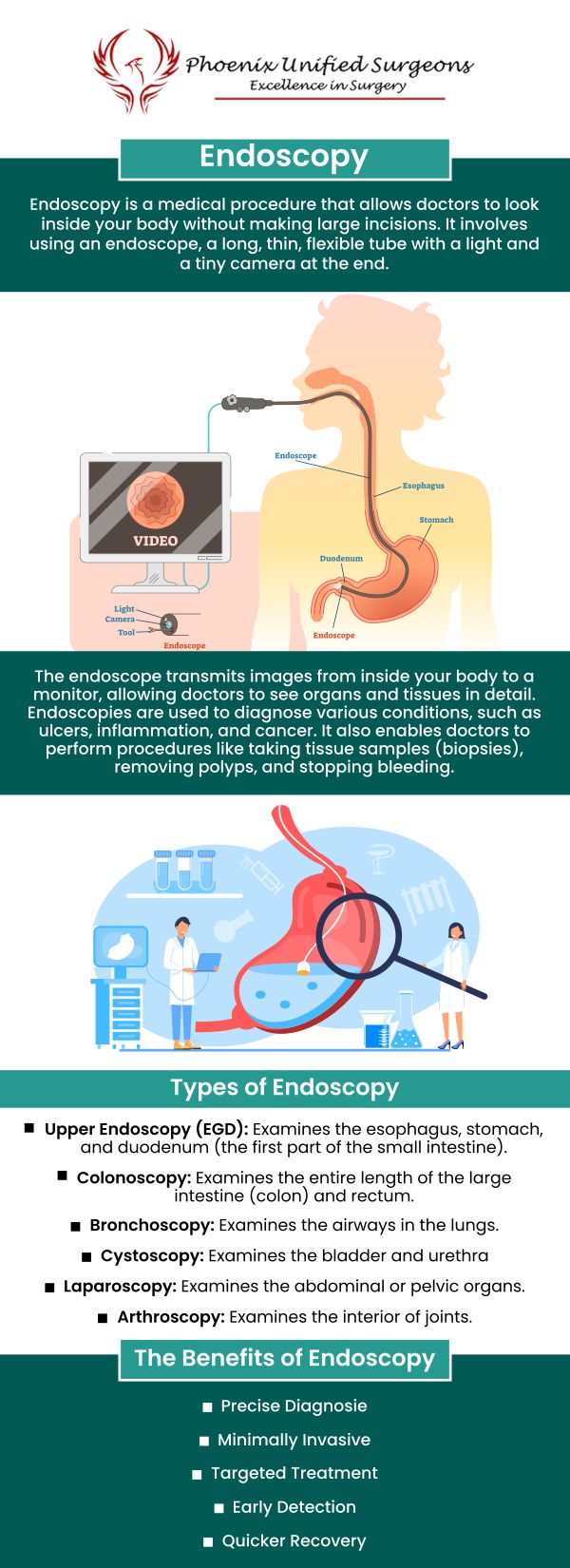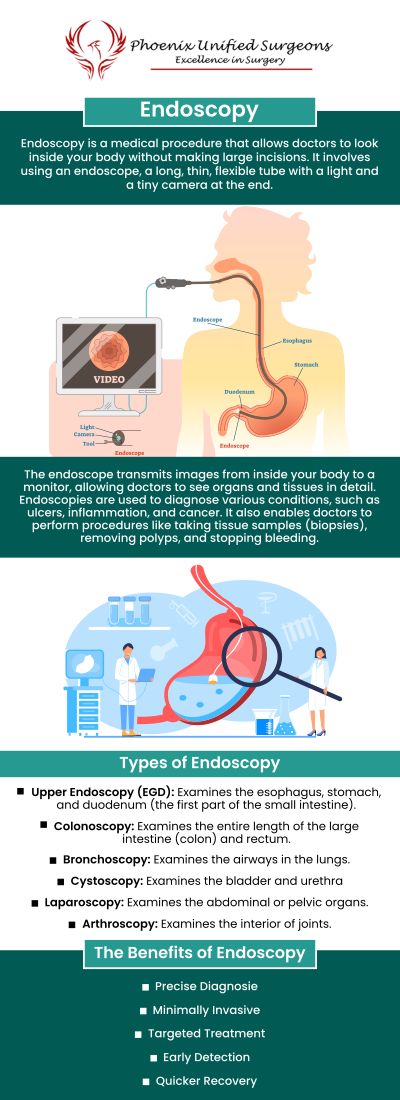Everything You Need to Know About Endoscopy
For knowledgeable endoscopic care that accurately diagnoses and treats your digestive health issues, visit Phoenix Unified Surgeons. To help you retain your best health, our skilled staff guarantees a painless and least intrusive process. Please contact us or book your appointment online. Our office is conveniently located at 20333 N 19th Avenue, Ste 230 Phoenix, AZ 85027.




Table of Contents:
What symptoms do you need for an endoscopy?
How long does the endoscopy procedure take?
How should I prepare for the endoscopy?
What do I need to bring on the day of my endoscopy procedure?
At Phoenix Unified Surgeons, we understand the importance of comprehensive and detailed medical evaluations, especially when it comes to digestive health.
An endoscopy procedure is often recommended if you exhibit certain symptoms or have a history of digestive conditions. Some common symptoms include persistent abdominal pain, difficulty swallowing, unexplained weight loss, and gastrointestinal bleeding.
Moreover, if you have a history of digestive conditions like ulcers or gastritis, or if there is a family history of certain types of cancer, our Phoenix Unified Medical team might advise an endoscopy, even in the absence of current symptoms. This procedure allows us to detect potential issues early, enhancing the chances of successful treatment.
At Phoenix Unified Medical, we know that these symptoms can be distressing, but they do not necessarily indicate a serious condition. However, they should not be ignored. Your doctor at Phoenix Unified Medical can determine if an endoscopy is necessary to further evaluate the cause and administer the appropriate treatment.
At Phoenix Unified Surgeons, we understand that any medical procedure, including endoscopy, can be a source of anxiety for many patients. We inform you about the procedure, what to expect, and how long it might take.
The time taken for an endoscopy procedure at our practice can vary depending on several factors. These include the type of endoscopy being performed, the complexity of the case, and your circumstances. Most endoscopic procedures at our practice typically take between 15 to 60 minutes to complete. For example, an upper endoscopy, which examines the esophagus, stomach, and duodenum, usually takes around 15 to 30 minutes. A colonoscopy, examining the large intestine, typically takes 30 to 60 minutes.
However, it’s important to note that these durations only represent the actual endoscopic examination. The overall process, which includes preparation before the procedure and recovery time after, will require additional time.
Before your endoscopy at Phoenix Unified Surgeons, you may need to undergo certain preparations, such as fasting or taking laxatives. The time for these preparations can vary. We generally advise patients to arrive at our clinic an hour or more before the scheduled procedure. Immediately before the procedure, you will need to change into a hospital gown and be given a sedative to help you relax, which can take around 30 minutes.
In total, you should expect to be at Phoenix Unified Surgeons for at least a few hours, even though the actual endoscopy is relatively quick. Please remember that these are general estimations, and the exact duration of your endoscopy procedure may be different depending on your circumstances.
At Phoenix Unified, our team of experienced medical professionals is dedicated to ensuring your endoscopy procedure is successful and safe. To achieve this, we have outlined several essential steps for you to follow:
Medical History and Current Medications:
During your consultation at Phoenix Unified, it’s imperative to discuss your medical history, current medications, over-the-counter supplements, and any allergies or sensitivities with your healthcare provider. Certain medications, like blood thinners or aspirin, may impact the outcome of the endoscopy procedure. Therefore, our team will provide you with specific instructions regarding which medications to continue or discontinue before your appointment.
Fasting and Bowel Preparation:
As part of your preparation for the endoscopy at Phoenix Unified, your digestive system needs to be empty. This typically involves avoiding solid food and dairy products for 8-12 hours before the procedure.
If you’re undergoing a colonoscopy as part of your endoscopy, our team will provide additional bowel preparation instructions. This typically involves taking a laxative solution or administering an enema to clear your bowels, as well as following a clear liquid diet the day before the surgery.
Additional Precautions:
We encourage all Phoenix Unified patients to avoid smoking for at least 12 hours before the endoscopy, as it can induce coughing and interfere with the procedure. Please also arrange for a reliable adult to drive you to and from our facility, as the sedatives used during the procedure may cause drowsiness or weakness. Allow extra time for registration and preparation before your appointment.
Other Recommendations:
We recommend you wear loose, comfortable clothing that allows easy access to your abdomen for your endoscopy at Phoenix Unified. Please also remove any jewelry, piercings, dentures, or contact lenses if necessary.
If you have any questions about the procedure, please discuss it with your healthcare provider at Phoenix Unified. Remember, an endoscopy is a routine procedure that can give insightful information on the state of your digestion.
The professionals at Phoenix Unified Surgeons are committed to ensuring your endoscopy procedure goes smoothly. We’ve put up a list to make it easier.
Clothing:
• Wear loose, comfortable clothing for your visit to Phoenix Unified. This allows easy access to your abdomen.
• Avoid anything with metal buttons or zippers, as they may interfere with the procedure.
• Bring a robe or change of clothing to wear post-procedure.
Personal Items:
• Bring your ID and health insurance card. This allows us to confirm your identity and process your insurance claim correctly.
• Bring your recent test results. This provides our Phoenix Unified healthcare team with important context for your procedure.
• Don’t forget your eyeglasses, hearing aids, or other assistive devices.
• A small bag for personal belongings you’ll need after the procedure can be helpful.
Medications:
• Kindly bring a list of all the drugs you now use, including dosages and frequency. This helps our healthcare team at Phoenix Unified understand your current regimen and avoid drug interactions.
• Note that some medications may need to be adjusted or discontinued before the procedure.
Other Considerations:
• For your endoscopy at Phoenix Unified, avoid eating or drinking anything for at least 8-12 hours before the procedure.
• Make sure to arrange for a competent adult to go with you to and from Phoenix Unified. You’ll be sedated during the endoscopy and won’t be able to drive or use public transportation afterward.
• Discuss any specific concerns or questions about the procedure with your Phoenix Unified doctor beforehand.
Additional Notes:
Depending on the type of endoscopy procedure you are undergoing at Phoenix Unified, there may be additional items you need to bring.
Ascertaining what you need to bring on the day of your endoscopic surgery is always a smart idea, since every medical institution, like Phoenix Unified Surgeons, may have distinct needs.
Phoenix Unified Surgeons offers top endoscopic treatments for the thorough diagnosis and management of digestive health problems. Please contact us or book your appointment online. Our office is conveniently located at 20333 N 19th Avenue, Ste 230 Phoenix, AZ 85027. We serve patients from Phoenix AZ, Sun City AZ, Peoria AZ, Surprise AZ, Glendale AZ, Scottsdale AZ, and surrounding areas.
Check Out Our 5 Star Reviews



Additional Services You May Need
▸ Colon & Rectal Surgery
▸ Gallbladder Surgery
▸ Colonoscopy
▸ Wound Care
▸ Hernia Repair
▸ General Surgery
▸ Robotic and Minimally Invasive Surgery
▸ Appendectomy
▸ Colon Repair/Resection
▸ Lipoma & Cyst Removal
▸ Endoscopy and Colonoscopy
▸ Abdominal Pain
▸ Colon surgery for Diverticulitis
▸ Colon surgery for Colon Cancer
▸ Hemorrhoids
▸ Anal Fistulas
▸ Anal Pain Surgeries
▸ Colostomy Avoidance Surgery
▸ Fecal Incontinence Surgery
▸ Crohn’s Surgery
▸ Ulcerative Colitis Surgery






